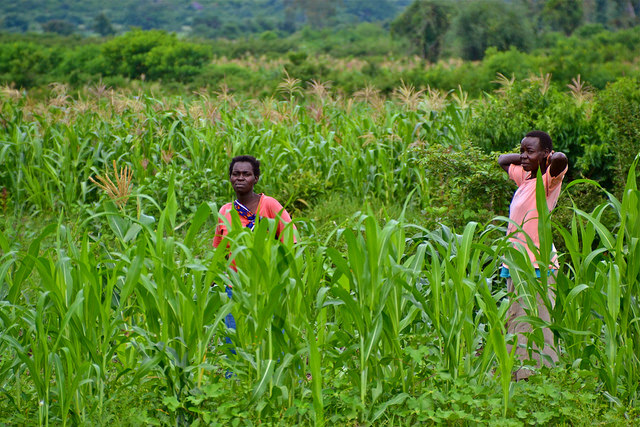What is the challenge?
In recent years there has been considerable attention to "gender and climate change," focusing particularly on the adverse impacts of climate change on women. However, these studies often lack a systematic empirical basis (beyond localized or anecdotal examples); where data are available, they too are often limited to comparison of male-headed and female-headed households. A further weakness is that many studies portray women as victims of climate change, without examining the extent to which women and men can be proactive in adapting to the adverse consequences of climate change or mitigating climate change. This study aims to address these oversights. The study will also provide information on the awareness and adoption of "Climate-Smart Agriculture practices" by men and women.

Key research questions:
- How might men and women be (differentially) affected by long-run climate change and short-term climate shocks?
- What are the characteristics and causes of gender differentials in vulnerability/resilience to weather-related risk (e.g. assets, information, empowerment in decision-making, rights, etc.)? How might the capacity to adapt to climate change be different for men and women?
- What are the adaptation options, strategies, and approaches (individual, household, or collective) that are available to and preferred by men and women? How are these different and why?
- Do men and women have different perceptions of climate change and climate risk? How do perceptions of climate change, climate risk, and personal values shape adaptation decisions and approaches?
- Does joint decision-making increase household resilience to climate change? Does joint decision-making lead to better outcomes at the household level for food security, income, or productivity? Are there tradeoffs in terms of intra-household power dynamics?
Activity:
This project enhances understanding of gendered climate change perceptions, impacts, and adaptation and coping strategies at selected CGIAR Research Program on Climate Change, Agriculture and Food Security (CCAFS) baseline sites in Bangladesh, Uganda, Senegal, and Kenya using a gendered household survey. The survey modules collect detailed gender-disaggregated data on climate change perceptions, assets, and adaptation. The research is done in collaboration with International Livestock Research Institute and contributes to strategies to increase resilience for women as well as men. The information will be used by researchers, policy-makers and development practitioners to better understand the vulnerabilities of men and women to climate change, how they differ, and what actions can be taken to reduce that vulnerability.
Collaborators:
International Livestock Research Institute, International Institute for Tropical Agriculture (IITA), International Center for Tropical Agriculture (CIAT), World Agroforestry Centre (ICRAF), Institut Sénégalais de Recherches Agricoles, DATA
Outputs
Syntheses and other joint partner communication products based on findings from CCAFS work with women and marginalized groups in Lower Nyando and Machakos, Kenya; Satkhira and Bagerhat (Khulna Division) Bangladesh; Rakai, Uganda; and Kaffrine, Senegal.
- Report on gendered perceptions, impacts, and coping and adaptation strategies.
- Policy briefs summarizing results of key research questions: both aim to identify mechanisms for gender targeting, including addressing whether the major constraints to adoption lie in information, control of assets and other resources, or attitudes.
- Papers on adoption/awareness of climate-smart agriculture practices
Links
- Bryan, E., Q. Bernier, M. Espinal, and C. Ringler. 2017. Making climate change adaptation programs in Sub-Saharan Africa more gender-responsive: Insights from implementing organizations on the barriers and opportunities. Climate and Development, available online: http://dx.doi.org/10.1080/17565529.2017.1301870.
- Kristjanson, P., E. Bryan, Q. Bernier, J. Twyman, R.S. Meinzen-Dick, C. Kieran, C. Ringler, C. Jost, and C. Doss. 2017. Addressing gender in agricultural research for development in the face of a changing climate: Where are we and where should we be going? International Journal of Agricultural Sustainability, available online: http://dx.doi.org/10.1080/14735903.2017.1336411.
- Bryan, E., Q. Bernier, M. Espinal, and C. Ringler. 2016. Integrating Gender into Climate Change Adaptation Programs: A Research and Capacity Needs Assessment for Sub-Saharan Africa. CCAFS Working Paper, 163. http://hdl.handle.net/10568/72482
- Bernier Q, Meinzen-Dick R, Kristjanson P, Haglund E, Kovarik C, Bryan E, Ringler C, and Silvestri S. 2015. What Influences Awareness and Adoption of Climate-Smart Agricultural Practices? Evidence from Kenya. CCAFS Working Paper No. 79. CGIAR Research Program on Climate Change, Agriculture and Food Security (CCAFS). Copenhagen, Denmark. Available at: https://cgspace.cgiar.org/rest/bitstreams/53043/retrieve
- Twyman J, M. Green, Q. Bernier, P. Kristjanson, S. Russo, A. Tall, E. Ampaire, M. Nyasimi, J. Mango, S. McKune, C. Mwongera, and Y. Ndourba. 2014. Adaptation Actions in Africa: Evidence that Gender Matters. CCAFS Working Paper No. 83. Copenhagen, Denmark: CGIAR Research Program on Climate Change, Agriculture and Food Security (CCAFS). Available at: https://cgspace.cgiar.org/bitstream/handle/10568/51391/WP83.pdf
- Kristjanson, P., Q. Bernier, E. Bryan, C. Ringler, R. Meinzen-Dick, and J. Mango. 2015. Learning about adaptation possibilities by talking to Kenyan female and male farmers separately. IFPRI Project Note 1. Washington, DC: International Food Policy Research Institute (IFPRI). Available at: http://ebrary.ifpri.org/cdm/ref/collection/p15738coll2/id/129755
- Kristjanson, P., Q. Bernier, E. Bryan, C. Ringler, R. Meinzen-Dick, and Y. Ndour. 2015. Implications of gender-focused research in Senegal for farmer's adaption to climate change. IFPRI Project Note 2. Washington, DC: International Food Policy Research Institute (IFPRI). Available at: http://ebrary.ifpri.org/cdm/ref/collection/p15738coll2/id/129754
- Kristjanson, P., Q. Bernier, E. Bryan, C. Ringler, R. Meinzen-Dick, and E. Ampaire. 2015. Gender and climate change adaptation in Uganda: Insights from Rakai. IFPRI Project Note 3. Washington, D.C.: International Food Policy Research Institute (IFPRI). http://ebrary.ifpri.org/cdm/ref/collection/p15738coll2/id/129753
Other links:
Enhancing Women's Assets to Manage Risk under Climate Change: Potential for Group-Based Approaches
Gender, Climate Change and Nutrition (GCAN) Integration Initiative
Contact:
Claudia Ringler (c.ringler@cgiar.org)
This project is led by International Food Policy Research Institute (IFPRI) and funded by CGIAR Research Program on Climate Change, Agriculture and Food Security (CCAFS)

Leave a Reply